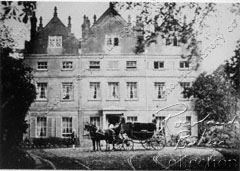| Boyle Farm - Noblesse Oblige |
After Lord St. Leonards retired from effective participation in politics, he settled down to live mainly at Boyle Farm. As the most influential resident in the parish he assumed the role of "squire", and considered it incumbent to show an active interest in local affairs. The village responded by pealing the church bells every year on his birthday.
He was a familiar figure as he rode around on horseback inspecting his property, or strolling with a walking-stick in his hand, which, it was said, he would shake vigorously at any young lads he saw, and threatened to give them a good beating if he caught them trespassing on his land. His large yellow carriage drawn by two prancing horses made a fine show when being driven through the district (258).
He was the principal guest at the opening of the parish school in September 1861, and thereafter visited it regularly. Annually, just before the start of the summer holiday, the children went along to Boyle Farm for a "treat". Where they had tea and games, followed by an uplifting address given by the great man himself, who never failed to tell them how he had risen from obscurity to become a cabinet minister, and to lecture them on their duty and respect to their betters (258).
An extra treat was arranged in 1863 to celebrate the marriage of the Prince of Wales. After the children had had their tea two hundred adults "of the working classes" sat down to a dinner of roast beef, plum pudding, and ale. Followed by a bonfire (upon which two thousand faggots and thirty tar barrels had been piled), and fireworks were lit on the eyot in the Thames (259).
 |
Entrance front to Boyle Farm Lord St. Leonards's coach, complete with liveried attendants in the foreground. |
His "good works" were not confined to Thames Ditton alone. In September 1860 two hundred and fifty children from the Wandsworth Female Orphanage whose fathers had been killed in the Crimean War were entertained at Boyle Farm. It was reported: "The children had an excellent dinner and enjoyed themselves highly in vigorous games in the beautiful grounds. His lordship addressed some kind words to the poor orphans and was so much affected by the sight before him that the tears ran down his cheeks. The band of the 12th. Surrey Volunteers provided the music and each child, upon leaving, was presented with a sixpence and a bun(260).
In 1867 Lord St. Leonards was patron of the annual Thames Ditton regatta (261).
On occasions Boyle Farm was even the venue for international gatherings. In July 1872 the foriegn representatives who had taken part in the International Prison Congress paid a visit here as his lordship's guests (262).
All books copyright © R G M Baker, all rights reserved.
Images © 2006 M J Baker and S A Baker, all rights reserved.
Web page design © 2006 M J Baker and S A Baker, all rights reserved.